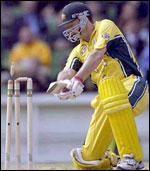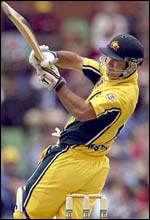Deja Waugh!
Daniel Laidlaw
The Australian selectors have attempted to replicate the formula that led to
victory at the 1999 World Cup by axing World Cup-winning captain Steve Waugh from the one-day team.
In 1997, acclaimed skipper Mark Taylor was dropped from an under-performing
one-day team when Australia's selectors were given an edict to select the
best possible one-day team. The instalment of Waugh as Taylor's successor to
the one-day captaincy ultimately led to World Cup glory. Taylor, however,
reportedly felt the two-captains policy, which existed until his retirement
after the Australian season in 1998-99, undermined his authority.
 Now, the selectors have repeated their successful gamble as they look ahead
to the 2003 World Cup by axing Waugh. The decision comes after Australia missed
the finals of its home tri-series competition for the third time in 23
years, finishing last with a 4-4 win-loss record.
Now, the selectors have repeated their successful gamble as they look ahead
to the 2003 World Cup by axing Waugh. The decision comes after Australia missed
the finals of its home tri-series competition for the third time in 23
years, finishing last with a 4-4 win-loss record.
The decision to drop Waugh, skipper of one of the best teams in Test history, as
one-day captain will come to be seen as either a courageous move to
revitalise an ageing team as it seeks to defend its World Cup title, or a
foolish gamble that destabilises a highly successful unit in both forms of
the game. The selectors' track record in this regard, however, is
impressive.
The decision to remove veteran leaders Mark Taylor and Ian Healy from the one-day side more than four years ago was controversial. However, it paved the way
for a determined Waugh to gain captaincy experience and ultimately
lead the team to greater glory, while the dismissal of Healy made room for
Adam Gilchrist, who quickly became one of the most dynamic openers in
one-day cricket and who could well be Waugh's successor. Both decisions were
ultimately justified.
Then, at the start of the 1999-2000 season, the selectors again made a bold
and controversial decision by ending the career of world-record holding
wicket-keeper Ian Healy. That led to the induction of Adam Gilchrist as Test
wicket-keeper, who has since been one of the key players in Australia's phenomenal success, averaging 51 as a No. 7 batsman.
The hallmark of the Australian selectors in recent years has been their
willingness to change a winning team to ensure it remains so, rather than
first waiting for it to falter. While Australia did fail to make the finals
and Waugh has been the target of some unjust criticism so soon after he led
his side to a crushing 3-0 victory over world champion aspirants South
Africa, this decision is in keeping with that philosophy.
Waugh, 36, had expressed his desire to lead Australia to the 2003 World Cup
and beyond, but with the possibility of age and poor form becoming a factor
in the year ahead, the selectors evidently felt Australia would be best
served by appointing a successor now and giving the new leader time to
prepare for the tournament.
In the ACB media release, chairman of selectors Trevor Hohns said: "After
reflecting on the VB Series, we decided that for the one-day side to
continue to be successful and to prepare for the 2003 World Cup, it was time
to make this change.
"There is no ideal time to announce a decision like this, but by making the
change now we hope that it will give the new captain a chance to step up and
grow into the role well before next February.
"It will also allow us to consult with that person so that he can have some
input into the side that contests the one-day series in South Africa
beginning next month."
Although he failed to make a century in either form of the game this season,
Waugh's form did not merit his axing, scoring 187 runs at 31.16, near his
career average of 32.90, as a number five in the recent one-day series. His
dismissal was evidently a long-term leadership decision, yet it still
reinforces the notion that one Waugh is being held accountable while the
other is not.
As a batsman, Mark Waugh deserves to come under the closest scrutiny after
another paltry series, returning 126 runs at an average of 21, a tally
boosted by a top score of an unbeaten 55 that was chancy and unconvincing. This
followed a Test season in which he made 269 runs at 33.62. Steve Waugh's
statistics were only marginally worse, scoring 219 at 27.37.
 Interestingly, Waugh does not believe his axing signals the end of his
325-game ODI career, saying in the ACB's release: "The challenge for me is
to now ensure that the Australian Test team wins the series against South
Africa and to play well enough to force my way back into the one-day team."
Interestingly, Waugh does not believe his axing signals the end of his
325-game ODI career, saying in the ACB's release: "The challenge for me is
to now ensure that the Australian Test team wins the series against South
Africa and to play well enough to force my way back into the one-day team."
Either that is wishful thinking or the ACB have left open the possibility of
his return, whether that be as player or captain, if his replacement does
not work out. That, though, seems highly unlikely.
The replacement of the Waugh twins had to begin eventually and this is the
start. The question now is who succeeds Waugh as one-day captain and who
fills his batting place at number five.
As vice-captain of the Test and one-day teams, Adam Gilchrist is clearly the
most likely candidate, but after a poor one-day series with a bat the
perennial question of whether he is capable of combining opening, captaining
and keeping remains. Now could be the time to find out, but his position as
vice-captain does not automatically mean he is next in line to be awarded
the captaincy.
After off-field indiscretions cost him the job in 2000, Shane Warne came
back into contention when he was given the vice-captaincy during Gilchrist's
absence for one game this season. Warne successfully filled in for Waugh as
one-day skipper during his absence through injury in 1998-99, but questions
over his personality and capability to diplomatically cope with all that
captaincy entails remains. At 32, he also may not have many years left in
the game.
 Ricky Ponting, 27, is another potential leader, but his temperament has also
been suspect in the past. Gilchrist appeals above all others, yet Australia
cannot afford to sacrifice any of his brilliance as a batsman, which could
occur if he was to also inherit the Test captaincy in future. It is a
difficult choice.
Ricky Ponting, 27, is another potential leader, but his temperament has also
been suspect in the past. Gilchrist appeals above all others, yet Australia
cannot afford to sacrifice any of his brilliance as a batsman, which could
occur if he was to also inherit the Test captaincy in future. It is a
difficult choice.
The other question Waugh's axing poses is what it means to his Test career.
A return to the two-captains policy is far from ideal, and it's implications
for Waugh's influence on the team, and how he adjusts to sharing
responsibility with someone else, will be crucial to Australia's continued
prosperity. Waugh's leadership philosophies have so profoundly shaped the
Australian side that it is difficult to imagine any captain successfully
imposing a different style while in control of the one-day team.
It may not mean the end of Waugh's Test career is nigh, but it is a clear
sign that he must continue to maintain the high standards he has set. A Test
series loss to South Africa, for example, could signal further change.
Waugh's replacement as a one-day batsman is more easily solved, as Darren
Lehmann's innings in the last game in Perth showed he deserves a place in
the middle order. If he is still deemed unsuitable or too old, Andrew
Symonds is also worthy of an extended run to prove himself.
The surprise decision, on the eve of a tour to South Africa, makes for some
intriguing times ahead in Australian cricket.
More Columns
Mail Daniel Laidlaw